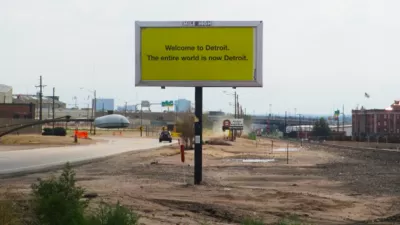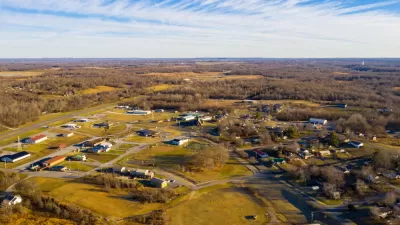The kinds of words and arguments people use to describe blight, foreclosure, and eviction reveals a lot of society's biases.

Kaeleigh Herstad provides a semantic analysis of rhetoric on the subjects of blight, foreclosure, and eviction in Detroit to reveal "local attitudes towards and concepts of ownership, poverty, race, and social justice."
Herstad spent two years documenting local media coverage of Detroit’s blight and foreclosure crises, and has identified a few pervasive themes. Herstad only needs one case study to illustrate these themes—the comments from a recent Detroit News article "about a negligent property owner, Jeffrey Cusimano, who does not pay property taxes or keep his properties up to code, yet faces no consequences for his actions."
Herstad identifies the following comments left on the article as indicative of larger themes, which she details thoroughly in the source article:
- “When someone plays the system like a fiddle, I tend to blame the system.”
- “Don’t you think that 19 evictions is more a reflection of the quality of tenants and their attitudes towards paying honest debts than it is of the system?”
- “And yet they have a dish on the roof.”
- “Why would anyone move in there in the first place? Did they expect it to magically transform? Hardly. It’s just an excuse to not pay.” and “Renters don’t take care of anything! Move in, destroy, move out.”
- The city should be giving this guy an award for even trying in Detroit. If he didn’t own these houses they would just be more shells to dump bodies in…” and “Who cares? Detroit is a Sewer!” and “Detroilet”
FULL STORY: The Rhetoric of Foreclosure and Eviction in Detroit

Maui's Vacation Rental Debate Turns Ugly
Verbal attacks, misinformation campaigns and fistfights plague a high-stakes debate to convert thousands of vacation rentals into long-term housing.

Planetizen Federal Action Tracker
A weekly monitor of how Trump’s orders and actions are impacting planners and planning in America.

In Urban Planning, AI Prompting Could be the New Design Thinking
Creativity has long been key to great urban design. What if we see AI as our new creative partner?

Portland Raises Parking Fees to Pay for Street Maintenance
The city is struggling to bridge a massive budget gap at the Bureau of Transportation, which largely depleted its reserves during the Civd-19 pandemic.

Spokane Mayor Introduces Housing Reforms Package
Mayor Lisa Brown’s proposals include deferring or waiving some development fees to encourage more affordable housing development.

Houston Mayor Kills Another Bike Lane
The mayor rejected a proposed bike lane in the Montrose district in keeping with his pledge to maintain car lanes.
Urban Design for Planners 1: Software Tools
This six-course series explores essential urban design concepts using open source software and equips planners with the tools they need to participate fully in the urban design process.
Planning for Universal Design
Learn the tools for implementing Universal Design in planning regulations.
Gallatin County Department of Planning & Community Development
Heyer Gruel & Associates PA
JM Goldson LLC
City of Camden Redevelopment Agency
City of Astoria
Transportation Research & Education Center (TREC) at Portland State University
Jefferson Parish Government
Camden Redevelopment Agency
City of Claremont





























